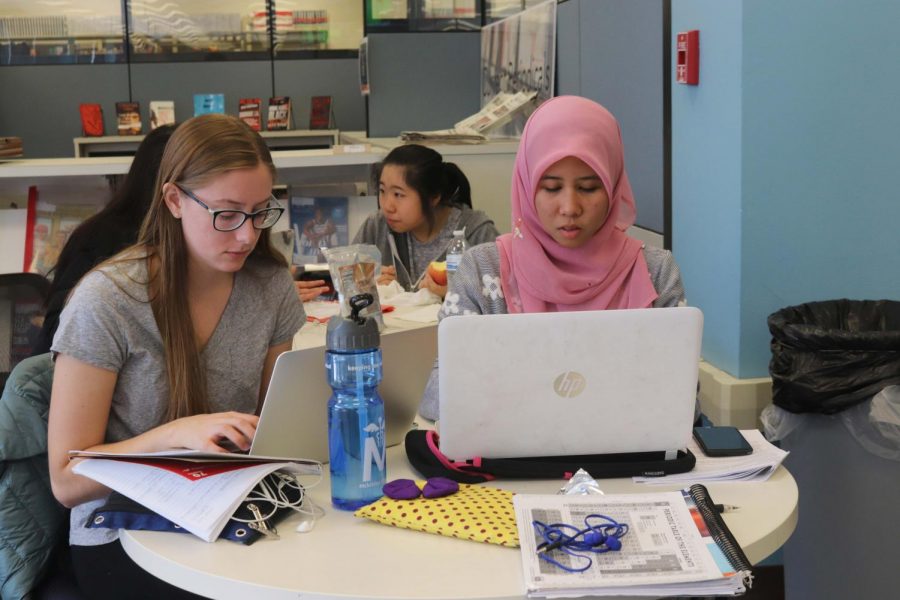Academic integrity violations reduce student educational development
Sophomores Eva Bucke and Hazirah Muhamad work on a project together at the Undergraduate Library. Group projects can be beneficial because they allow students to learn how to work together.
Nov 14, 2017
During this past spring, there were 102 reported cases of academic integrity violations in the College of LAS.
Robert Steltman, executive assistant dean of LAS, suggested that there were likely more violations that occurred throughout the semester, but that only 102 were officially reported through the University’s online system.
According to Article 1-402 in the Student Code, academic integrity violations include a variety of illicit actions such as cheating, plagiarism, fabricating assignments, bribing professors, taking an exam for another student and removing test materials from a classroom.
In addition, Article 1-403 of the Student Code states that an instructor who believes a student has violated the academic integrity policy must notify the student immediately, specifically by email.
This is called an allegation notice, which is also sent to the department and college of the specified course. The student has 10 days to respond with explicit details and facts pertaining to why the allegation was made. The instructor will survey the student’s provided response and make his or her decision, which will then be reported to the department or unit executive officer.
Get The Daily Illini in your inbox!
If an instructor believes that a student has not committed a violation of academic integrity after this process, the student may continue the course without penalty. If an instructor believes that an academic integrity violation has taken place, they can implement a sanction of their choice, demonstrated in Article 1-404. These sanctions include a reduced grade on the assignment, a failing grade for the assignment or a failing grade for the entire course.
“(Students) are unprepared. They’re doing things at the last second, and they’re trying to do too many things at once,” Steltman said. “The minute you cut a corner, you’re not fully experiencing your education.”
He also said students tend to develop the skills they practice time and time again. If students repeatedly violate the University’s Student Code, Steltman stressed that they aren’t gaining the educational experience their professors intended, and therefore they are selling themselves short.
While it is up to students, in this situation, to uphold academic integrity, Steltman said that professors in LAS should reiterate the coursework they will accept in their syllabi more clearly. This is something that is better emphasized in the University’s STEM courses.
Steltman explained that the primary motivation for students to violate academic integrity policies is when they find themselves under a great deal of pressure and, as a result, they seek dishonest solutions. Professors could alleviate some of this stress by being more clear on things like late assignment policies.
“If you’re gonna accept homework in certain situations but not others, then you have to make absolutely sure that students understand the distinction,” Steltman said. “One of the things we do is make sure that we go over academic integrity thoroughly in our LAS 101 course. This is a responsibility that the institution has to accept.”
The Office for Student Conflict Resolution is responsible for administering the Student Code. When a student is accused of violating academic integrity, the office keeps track of student infractions and notifies students after each infraction.
“If somebody gets a third infraction, they go before a disciplinary court,” Steltman said. “Those are the students who get dismissed, and somebody who commits multiple infractions is in danger of being dismissed.”
Steltman offered some advice for students who think they can take shortcuts.
He said students should choose classes they have an aptitude for and can be prepared for. They should understand the important connection between class responsibilities and lectures without needing to cheat.
Steltman also said students should realize that they must function differently than they did in high school, treating their education as a full-time job. While this is not always easy, he said that it is a task that members of the University have to do together.
“You are trying to learn something so that it becomes part of you, so it becomes a part of who and what you are,” Stelman said. “That requires full-time concentration, and if you do that, it is much harder to commit acts of academic integrity violations, because you don’t need to.”






